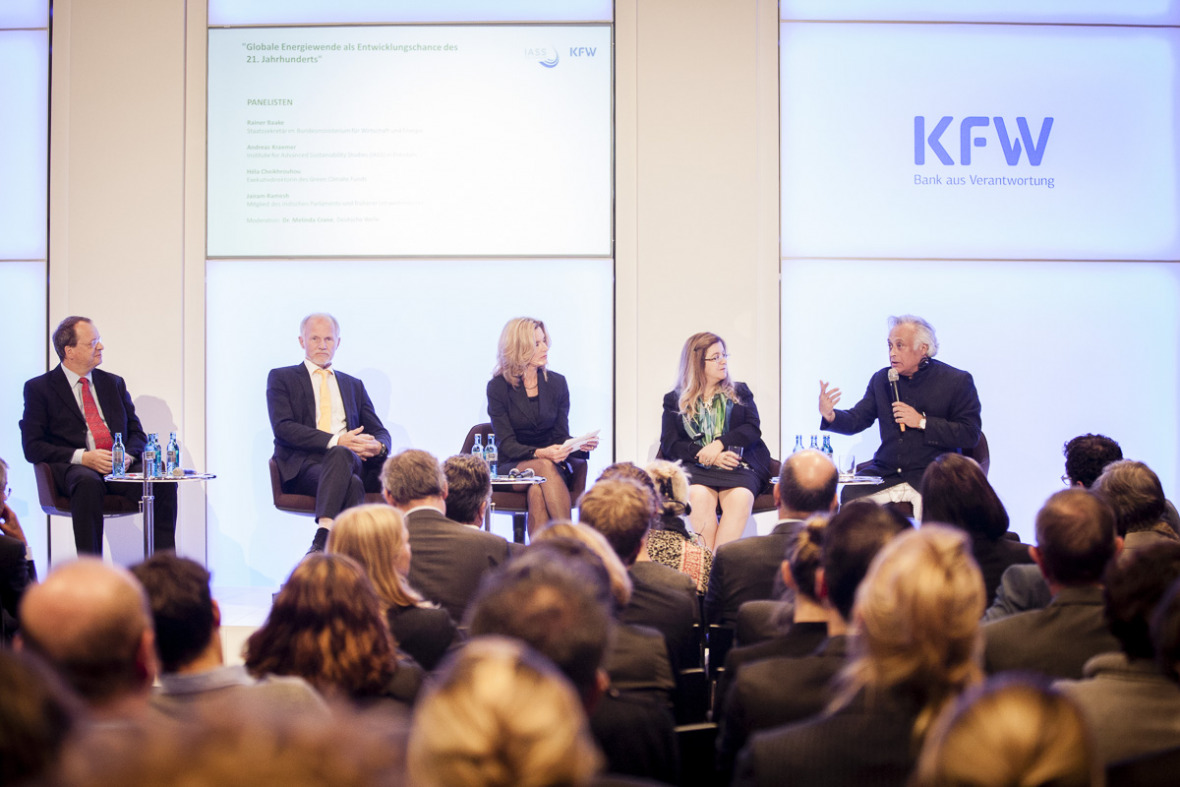Headline:
“The Benefits Are Greater than the Costs”: The German Energiewende and Its International Impact
Podium Discussion

The German energy transition is an important stimulus for climate protection worldwide. This was the consensus of the expert panel discussion on “The German Energiewende as a Development Prospect in the 21st Century”, co-organised by the KfW bank group and the IASS on 29 September in the KfW’s Berlin office. What has been the effect of this fundamental transition beyond the borders of Germany? And how can it serve as a model in other regions? These questions provided material for a lively debate among the international experts.

Decisive for the rapid spread of renewable energies worldwide, suggested Reiner Baake, State Secretary of the German Federal Ministry for Economic Affairs and Energy, are the falling costs of wind and solar power. This drop in price, Baake noted, can be traced back to the longstanding support of the German government for renewable energy, including purchase obligations and feed-in tariffs. “The German electricity consumer paid for a learning curve that was very expensive, but significantly contributed to helping prices to sink around the world – it is perhaps Germany’s greatest contribution to climate protection.”
India still requires coal to satisfy its energy needs
R. Andreas Kraemer from the IASS went even further and suggested that the benefits of renewable energies and the Energiewende are still being underestimated. He argued that there is no longer any economic reason to invest in coal because by now renewables are less expensive overall.
Jairam Ramesh, former Minister of Environment, Forests and Climate Change in India, disagreed: the energy demands of his country are simply too great; India cannot at present afford to completely abandon an important energy source. “We are 16 Germanys. And we have to provide an additional 15 gigawatt hours every year because our population is growing and our economy is growing. Trying to manage this using only renewable energy would be nothing but romanticism.” Nevertheless Ramesh, who is currently a Distinguished Senior Fellow at the IASS, affirmed that Germany is an important pioneer in this matter. “If an industrial nation like Germany with 80 million inhabitants is capable of making this transition, it sends a very important signal.”
Developing the Best Technology
The Executive Director of the Green Climate Fund (GCF), Héla Cheikhrouhou, also saw Germany as having a leading role, because it is capable of developing the best technological solutions, which can then be employed elsewhere in the world. During the discussion Cheikhrouhou also emphasised the importance of regional electricity markets and interconnectors for an efficient electricity supply. The fund that has been created as part of the UN negotiations is a key instrument for supporting the climate protection efforts of poorer countries and helping them to adapt to climate change.
Unlike their opinions on coal, the panel experts agreed in their verdict of the scandal over Volkswagen’s manipulation of emissions tests. These events will not cause long-term damage to Germany’s reputation as a pioneer in climate protection, they concluded. It is even possible that the scandal could become a “Fukushima of the automobile industry” (as Ramesh put it) and give it a crucial push towards electromobility.
The KfW is an important driver of the energy transition
In his opening of the panel discussion, KfW Executive Board Member Norbert Kloppenburg emphasised that the KfW is considered an important driver of the Energiewende – both in Germany and abroad – and that it will continue to play this role in the future. As part of their “Energy Turnaround Action Plan” the development bank has already pledged 60 billion euro in Germany since 2012 and 9 billion euro around the world between 2010 and 2014 for renewable energy and energy efficiency. “We are helping to sponsor this process,” Kloppenburg said, “which is probably the greatest transformation since the beginning of industrialisation.”
09.10.2015
Source: KfW
